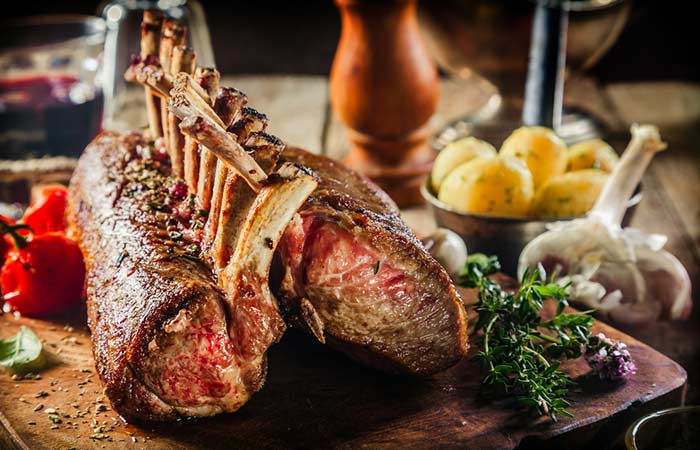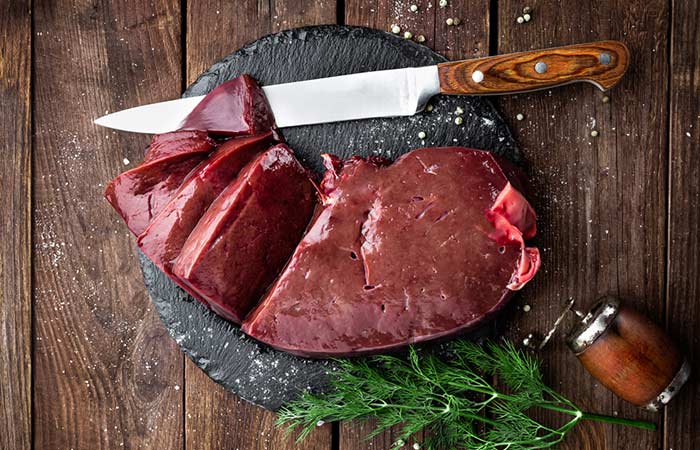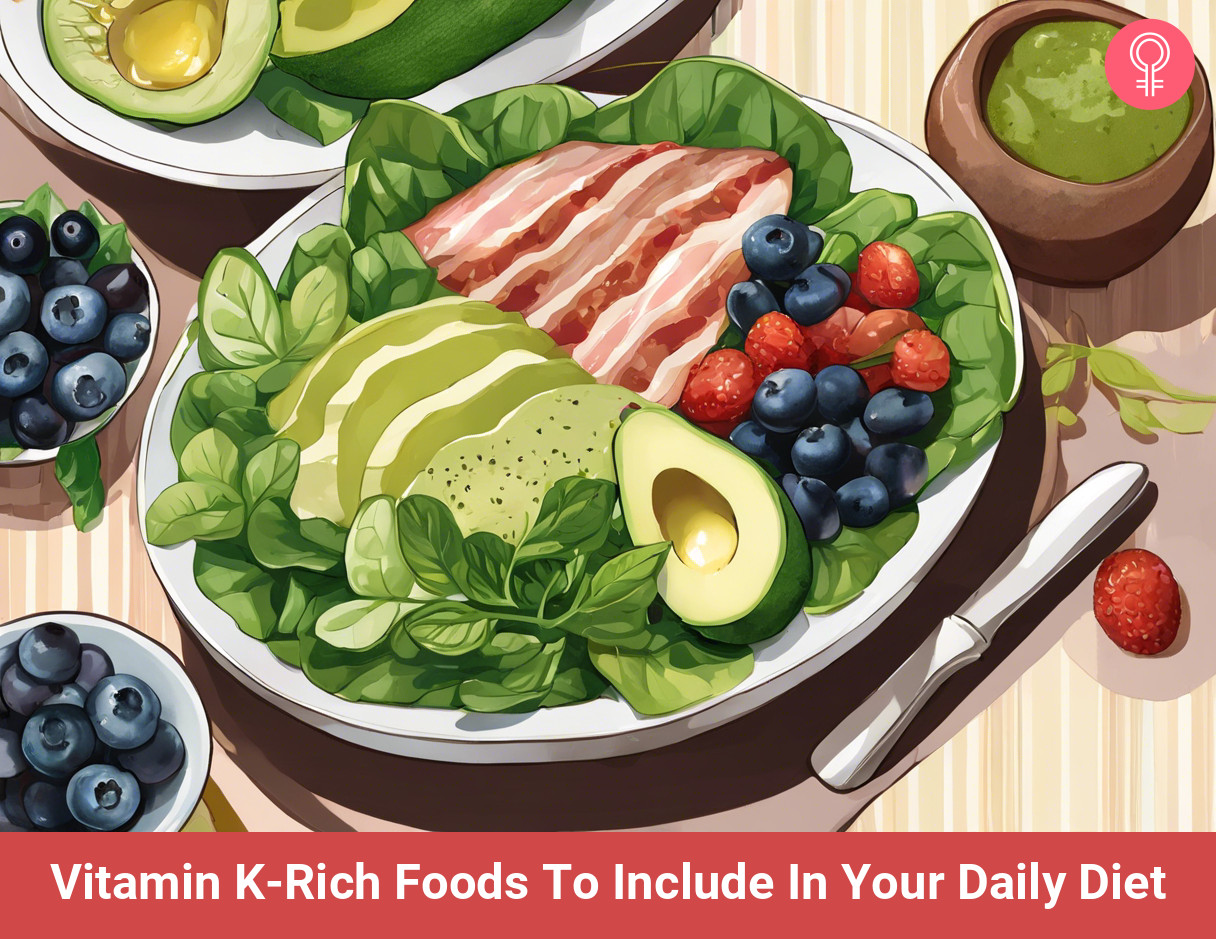In a fast-paced life, we often neglect the importance of a wholesome meal. Vitamins are paid the least attention. Vitamin K deficiency affects 50% of infants in the US, among other vitamin deficiencies . Including vitamin K-rich foods in daily diet can greatly help to combat this.
Although rare, this deficiency may cause excessive bleeding and hemorrhage even in adults.
If this deficiency is not corrected in infants, it may be fatal at times.
For this reason, recognizing which foods have this vitamin in wealth is required. This short article will help you comprehend the relevance of vitamin K and its science-backed benefits. You will additionally learn more about the best nutritional resources of vitamin K, advised dose, and various other benefits of the vitamin. Scroll to check out even more.
In This Article
Why Vitamin K – The Science
Your body needs vitamin K to produce a protein called prothrombin, which assists in blood clotting and bone metabolism. This vitamin can safeguard you from osteoporosis, enhance your heart wellness, and help stop cancer cells.
Most likely, one of the most important aspect of vitamin K is just how it can assist deal with vitamin K deficiency bleeding in babies. All infants are a higher risk of this problem until they are 4 to 6 months old, which is when they generally begin consuming routine foods, and the intestinal microorganisms start synthesizing vitamin K too. This is where vitamin K shots assist-- round provided to the infant's thigh can protect against the problem. Oversight in this element can be fatal ( 1 ).
There are three types of vitamin K, but only one of them is the most beneficial:
- Vitamin K1 (also called phylloquinone) is what you discover naturally in environment-friendly veggies. It enters your liver and aids blood clotting.
- Vitamin K2 (additionally called menaquinone) is found in animal and fermented items and is likewise generated by your intestine germs. It goes to your bones and blood vessels and various other tissues other than your liver.
- Vitamin K3 (also called menadione) is a synthetic form of the vitamin that is not recommended.
One of the most powerful and effective form of vitamin K is K2. It is all-natural and not toxic also at 500 times the RDA. Vitamin K2 is made in our body and is additionally generated in fermented foods. In fact, increasing your vitamin K2 intake is the most recommended and safest way of fighting the deficiency.
Some reliable sources even dub vitamin K2 as the missing link between human diet and killer diseases.
There are various methods you can get all the vitamin K2 you need. A lot of foods include vitamin K1, and we people have the capability to partly convert this into vitamin K2. Vitamin K2, as we saw, is likewise generated by the intestine germs. Yet unfortunately, both these approaches are not as reliable if you are aiming to obtain abundant levels of vitamin K2.
The graph below is taken from a research study published in Scientific Reports that was carried out to examine the key dietary impacts of changing all meat and beef just in the mean American diet (MAD) with protein-conserving, nutrient-dense plant-based different diet regimens. According to the scientists, substituting all meat or beef with the suggested plant substitutes developed below is normally useful as there is boosted distribution of nutrients. Hence, one can raise their consumption of vitamin K with plant-based beef substitutes.
Effects Of Replacing Meat-Based Foods With Plant-Based Ones
So, what’s the next best option? Consuming foods rich in vitamin K2.
What Are The Foods Rich In Vitamin K2?
Given that vitamin K2 is the most effective sort of the vitamin, we'll first review its food sources. Consuming foods rich in vitamin K can only include in the benefits, and we will certainly take a look at those as well-- a little later.
1. Natto
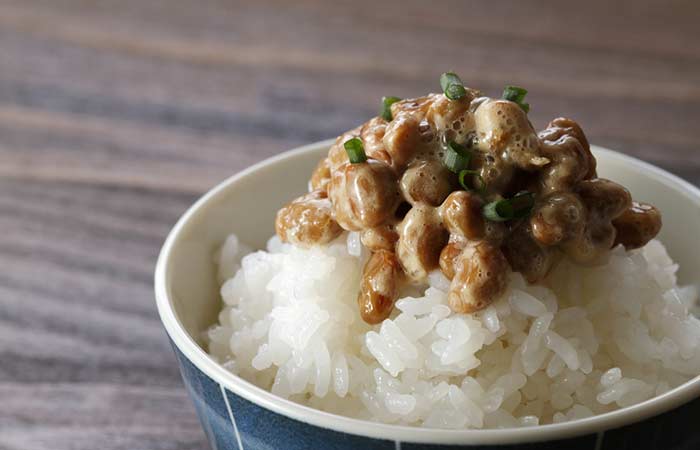
3.5 ounces (100 grams) of natto consists of 1,000 mcg of vitamin K2, which is close to 10 times the RDA. You can ideally take 1 ounce of natto for the benefits.
This Japanese staple is made from fermented soybeans. It has a solid taste and scent, and a lot of Westerners wouldn't even have actually come across it.
Studies show that intake of natto can increase vitamin K2 levels in individuals (2). Natto is additionally a good source of healthy protein and fiber, which have their own benefits. While protein helps develop the body, fiber help digestion and promotes healthy weight loss .
How To Include In Your Diet
You can simply top your rice dishes with natto. This is one popular way of consuming it.
2. Miso
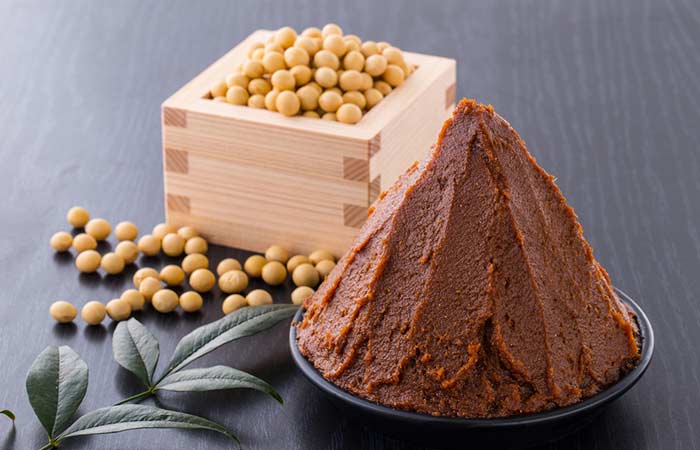
100 grams of miso contains 29.3 mcg of vitamin K2, which meets 37% of the RDA.
This is another popular Japanese dish that is made of fermented beans. Fermented foods like miso enhance the beneficial bacteria in the gut, thereby boosting absorption and the assimilation of nutrients. And these beneficial bacteria also synthesize vitamin K2, further enhancing the nutrient levels in the body.
How To Include In Your Diet
You can thicken your salads using miso – it works as a great salad dressing.
3. Mayonnaise
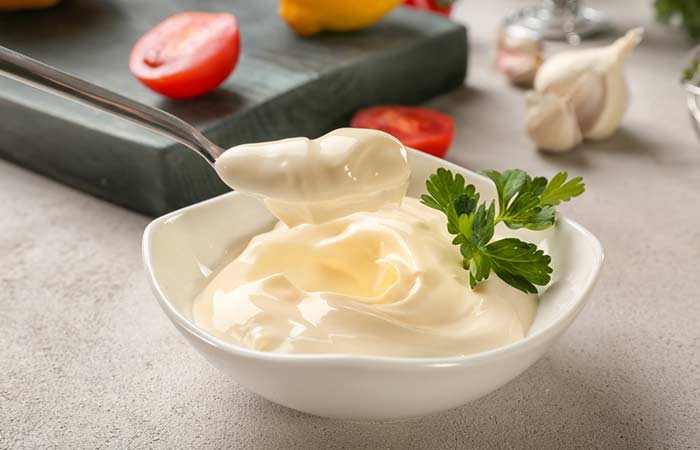
1 cup of whole-egg mayonnaise contains 197 mcg of vitamin K2, which meets 220% of the RDA.
This is the cholesterol-free variety, which also contains vitamin E that is good for the heart and skin. Vitamin E is additionally an anti-oxidant that protects the body from cost-free radicals.
How To Include In Your Diet
Use mayonnaise as a bread spread for your morning breakfast.
4. Lamb
100 grams of lamb chops contain 5.3 mcg of vitamin K2, which meets 7% of the RDA.
Given that lamb is meat, it is abundant in protein. It is a top notch healthy protein resource as it consists of all the essential amino acids . Along with vitamin K2, lamb meat additionally contains good quantities of selenium and zinc, both of which deal with different physical functions.
How To Include In Your Diet
You can include lamb meat chops in your dinner or lunch.
5. Beef Liver
100 grams of beef liver contains 3.1 mcg of vitamin K2, which meets 4% of the RDA.
In addition to vitamin K, beef liver is an abundant source of iron. As a matter of fact, it is one of the most effective resources of the nutrient. Iron assists produce power and help the transport of oxygen throughout your body.
Beef liver is also replete with vitamin A. Vitamin A promotes vision and skin health.
However be cautious regarding vitamin A. Since beef liver is abundant in it, consuming it everyday can lead to vitamin A toxicity.
How To Include In Your Diet
You can have beef chops along with your rice preparations.
Did You Know?While most vitamin K2 sources are land animals, eel functions as a fish and shellfish alternative. A 100g serving of eel supplies 63.1 mcg of Vitamin K2 (8 ).
These are the foods abundant in vitamin K2, which, as we talked about, is one of the most powerful type of vitamin K. However, consuming foods rich in vitamin K1 alone can additionally help-- which is what we will certainly cover currently.
What Are The Foods Rich In Vitamin K1?
The majority of environment-friendly leafy vegetables are superb sources of vitamin K1. We have covered the majority of them and a couple of others, which, if taken in, can improve your vitamin K1 levels like nothing else. Your body converts a few of this vitamin K1 right into K2, assisting you with adequate levels of the nutrient.
1. Raw Swiss Chard
100 grams of Swiss chard contain 830 mcg of vitamin K1, which meets 692% of the RDA.
2. Cooked Kale
100 grams of kale contain 817 mcg of vitamin K1, which meets 681% of the RDA.
Related: 16 Benefits Of Kale, Nutrition, Recipes, Uses, And Risks
3. Raw Spinach
100 grams of spinach contain 483 mcg of vitamin K1, which meets 402% of the RDA.
4. Collard Greens
100 grams of collard greens contain 407 mcg of vitamin K1, which meets 339% of the RDA.
5. Cooked Cabbage
100 grams of cabbage contain 109 mcg of vitamin K1, which meets 91% of the RDA.
Related: 11 Health Benefits Of Cabbage, Nutrition, And Side Effects
6. Hard Cheese
100 grams of hard cheese contain 87 mcg of vitamin K1, which meets 72% of the RDA.
7. Prunes
100 grams of prunes contain 60 mcg of vitamin K, which meets 50% of the RDA.
8. Cooked Green Beans
100 grams of green beans contain 48 mcg of vitamin K1, which meets 40% of the RDA.
9. Sun-Dried Tomatoes
100 grams of tomatoes contain 43 mcg of vitamin K1, which meets 36% of the RDA.
10. Kiwis
100 grams of kiwis contain 40 mcg of vitamin K1, which meets 34% of the RDA.
Related: 12 Benefits Of Kiwi Fruit, Nutrition Facts, & Side Effects
11. Blue Cheese
100 grams of blue cheese contain 36 mcg of vitamin K1, which meets 30% of the RDA.
12. Bacon
100 grams of bacon contain 35 mcg of vitamin K1, which meets 29% of the RDA.
13. Cashews
100 grams of cashews contain 34 mcg of vitamin K1, which meets 28% of the RDA.
14. Cooked Green Peas
100 grams of green peas contain 26 mcg of vitamin K1, which meets 22% of the RDA.
15. Butter
100 grams of kale contain 21 mcg of vitamin K1, which meets 18% of the RDA.
16. Avocados
100 grams of avocados contain 21 mcg of vitamin K1, which meets 18% of the RDA.
17. Blueberries
100 grams of kiwis contain 19 mcg of vitamin K, which meets 16% of the RDA.
18. Pomegranate
100 grams of pomegranate contain 16 mcg of vitamin K1, which meets 14% of the RDA.
19. Mustard Greens
100 grams of cooked mustard greens contains 335 mcg of vitamin K1, which meets 279% of the RDA.
100 grams of raw mustard greens contains 275 mcg of vitamin K1, which meets 229% of the RDA.
Raw and cooked mustard environment-friendlies have a high content of vitamin K1 that might help enhance bone and heart health and is effective for blood clotting.
19. Soybean Oil
100 grams of soybean oil contains 118 mcg of vitamin K1, which meets 98% of the RDA.
These are the other everyday foods abundant in vitamin K1 like broccoli, brussels sprouts, parsley, lettuce asparagus, and egg yolk. However why should you even know about them? Just how can they serve you?
Related: 20 Benefits Of Pomegranate Juice, How To Make It, & Nutrition
What Are The Benefits Of Vitamin K?
Intake of adequate vitamin K (vitamin K1 or K2) can benefit you in more ways than one.
1. Vitamin K2 Improves Bone Density
Did you know that your body needs vitamin K2 to use calcium and build bones?
Most often, we focus on calcium alone, but vitamin K2 is as important for strong bones as any other nutrient.
Vitamin K2 improves bone quality, and this can decrease the danger of cracks. Which is why the vitamin might also assist deal with postmenopausal osteoporosis ( 3 ).
2. Prevents Bleeding In Infants
We already saw this. Because babies can't eat regular foods until they are 4 to 6 months old, they go to a higher danger of vitamin K shortage-- which can typically lead to deadly blood loss. Much more so, babies' intestinal tract vegetation are not established to synthesize vitamin K1 yet.
Studies show that this can be prevented by an oral dose of vitamin K1 after birth ( 4 ).
3. Is Good For The Heart
One major reason for cardiovascular disease is the calcification of arteries-- when calcium from the blood obtains transferred within arteries, developing plaques. Vitamin K2 prevents this. It maintains calcium out of your artery linings, consequently boosting heart health and wellness ( 5 ).
4. Can Help Fight Cancer
The anti-inflammatory effects of vitamin K2 can prevent cancer. Studies show how this nutrient can have tumor-suppressive actions ( 6 ). Other studies show how long-term intake of vitamin K2 can prevent death from cancer.
5. Vitamin K1 Enhances Brain Function
The anti-inflammatory residential or commercial properties of vitamin K1 can prevent oxidative stress and anxiety in the mind, and this enhances cognitive function therefore. Vitamin K1 likewise improves the performance of sphingolipids, compounds that support the ideal performance of the brain.
6. Helps With Blood Clotting
Vitamin K1 is used by the body to help blood clot, and this can be beneficial during injury.
7. May Help With Diabetes
Vitamin K supplementation is shown to improve insulin response and glucose tolerance, thereby aiding glycemic regulation ( 7 ). This shows vitamin K’s potential in preventing or delaying the symptoms of diabetes.
Did You Know?In situations of consumption of rat poison by people or pets, huge quantities of vitamin K is provided to stabilize coagulation ( 7 ).
As we discussed, vitamin K2 is the most powerful and extremely recommended kind of the nutrient. Just how much of vitamin K2 must you consider these benefits? Any particular dose?
What Is The Recommended Daily Allowance Of Vitamin K2?
The following table will give you an idea:
| Age | Male | Female |
|---|---|---|
| Upto 6 months | 2 mcg | 2 mcg |
| 7 to 12 months | 2.5 mcg | 2.5 mcg |
| 1 to 3 years | 30 mcg | 30 mcg |
| 4 to 8 years | 55 mcg | 55 mcg |
| 9 to 13 years | 60 mcg | 60 mcg |
| 14 to 18 years | 75 mcg | 75 mcg |
| 19+ years | 120 mcg | 90 mcg |
| 19+ years (pregnancy and/or lactation) | 90 mcg |
Not meeting these dosages can lead to a deficiency of vitamin K1 or K2, the symptoms of which include:
- You might bruise easily.
- You might experience blood clots underneath your nails.
- You may get dark black stools (with blood, sometimes).
However, taking in vitamin K (K1 or K2) over or under particular problems can have detrimental effects as well. These can include the following:
- Issues During Pregnancy And Breastfeeding
Vitamin K is safe in recommended amounts. If you are pregnant or breastfeeding, avoid consuming it in high amounts.
- Might Lower Blood Sugar Way Too Much
Vitamin K might decrease blood glucose levels, and this might create concerns if someone is currently on blood sugar level medicine.
- May Harm The Kidneys
Excess vitamin K can interfere with dialysis – if you are receiving the treatment for kidney disease.
- May Aggravate Liver Disease
High doses of vitamin K can make clotting issues worse in people with liver disease
Infographic: Why You Should Add Vitamin K To Your Diet
Vitamin K is a fat-soluble vitamin that is necessary for the synthesis of various healthy proteins in the body. While there are several advantages of including vitamin K in your diet regimen, we have covered the most vital ones in the infographic below. Inspect it out to understand extra.
Get the high-quality PDF version of this infographic.
Our bodies do synthesize vitamin K2, yet it is inadequate to satisfy the daily advised degrees. So, the very best way out is to consume enriching vitamin K foods, which greatly include natto, miso, mayonnaise, lamb, beef, liver, etc. Babies are typically lacking in vitamin K as they do not consume routine foods, so a shot of this trace element is necessary to prevent vitamin K1-deficiency-bleeding. Besides, it improves bone and mind wellness and reduces the danger of cancer, heart disease, and osteoporosis.
Males and female above the age of 19 should attempt to take 120 mcg and 90 mcg of vitamin K2, specifically, to meet the body's demands.
Frequently Asked Questions
What happens if you take too much vitamin K?
If it is the vitamin K you receive from food or digestive synthesis, poisoning is rare. But when your dose surpasses with supplements or shots, the vitamin can develop in your blood and come to be hazardous. Signs and symptoms include sweating, rigidity in your breast, and also purging.
Is vitamin K water-soluble?
No, it is fat-soluble. Vitamin K is soluble in lipids (fats); it is absorbed in fat globules that then travel through the intestines and right into the blood circulation of the body.
Is vitamin K the same as potassium?
No. Both are different and essential micronutrients.
Are bananas high in vitamin K?
No, bananas are low in vitamin K. A 100g of banana contains only 0.1mcg of vitamin K ( 9 ).
Are eggs high in vitamin K?
No. Eggs contain only 0.3-0.7 mcg of vitamin K per 100 g ( 10 ).
Are carrots high in vitamin K?
Carrots are a substantial vitamin K food source. A 100 g of carrots contain around 13.2 mcg of vitamin K ( 11 ).
Is potato rich in vitamin K?
No, potatoes contain low amounts of vitamin K. A 100 gm of potato contains only 2 mcg of vitamin K ( 12 ).
Is coconut high in vitamin K?
No, coconut is not high in vitamin K. A 100 g of coconut contains only 0.2 mcg of vitamin K ( 13 ).
Are lemons high in vitamin K?
No. Lemons do not contain vitamin K ( 14 ).
Is Papaya high in vitamin K?
No. Papaya contains low amounts of vitamin K. A 100 g of papaya contains around 2.6 mcg of vitamin K ( 15 ).
Key Takeaways
- There are three sorts of vitamin K called K1, K2, and K3. K2 is the greatest, most natural, and effective sort of vitamin K.
- Mayonnaise, miso, lamb, and beef liver are some good sources of vitamin K2.
- Vitamin K2 helps treat postmenopausal osteoporosis and improves the quality of bones.
- Vitamin K1’s anti-inflammatory properties can reduce oxidative stress and enhance cognitive function.
Discover the leading vitamin K-rich foods that you must contribute to your diet regimen for a well balanced and delicious meal. Get the realities and start consuming healthier today by seeing the video clip listed below.


